If you don’t understand your audience’s behavior, you’ll have a much harder time nurturing them down the sales funnel effectively. On top of that, it can prove difficult to identify their actions on your website and other marketing channels.
Traditionally, brands relied on web analytics to gain insights into their customers and how they move through the sales funnel. But web analytics covers a lot of metrics, and unless you know what you’re looking for, it can be easy to over-analyze or put your focus on unnecessary tactics.
Fortunately, AI website analytics has automated data processing, offering actionable insights that marketers should take. With these insights, marketers can better highlight their customers’ needs and nurture them down the sales funnel.
In this article, we’ll explore how AI-driven website analytics can revolutionize your marketing strategy, uncover hidden opportunities, and deliver unparalleled insights.
Key Takeaways on AI Website Analytics
- AI website analytics automates customer data analysis and offers insights in real time.
- Using AI data analysis can improve customer understanding, increase ROI, recommend actions in real time, offer predictive analysis, personalize the marketing process, and streamline A/B testing.
- To start using AI website analytics, identify your goals, find the best AI tools, and monitor the results.
- AI website analytics has challenges like data privacy, learning curves, and high costs.
- Future AI web analytics predictions include more integrations with marketing and sales platforms, analyzing vocal and visual data, and hyper-personalized strategies.
TABLE OF CONTENTS:
What Are AI Website Analytics?
AI-powered web analytics automates many of the manual tasks associated with data analysis, including collecting user engagement, website traffic, and conversion rates.
Once these tools have this data, they generate insights that marketers can use to improve their campaigns. AI tools use machine learning, natural language processing (NLP), and predictive analytics to deliver insights in real-time.
In addition to web analytics, AI tools can offer insights into user trends and behaviors, helping marketers better target their audience.
How do AI website analytics work? Instead of reporting a drop in conversion rates, AI can identify the likely causes—such as slow page load times, poor navigation, or changes in user behavior—and suggest solutions.
Benefits of Using AI Website Analytics in Marketing
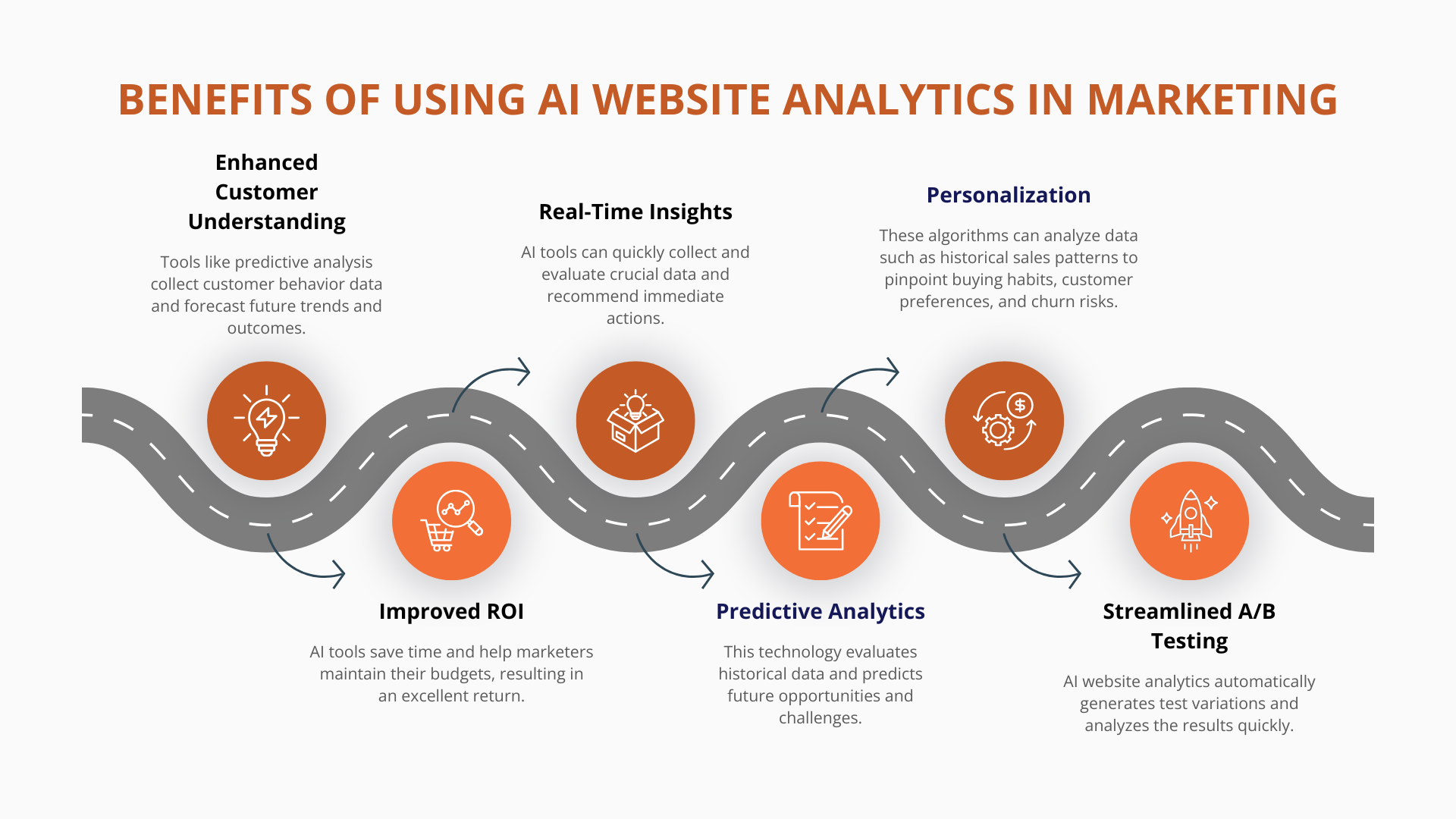
AI website analytics offers many advantages for marketers, such as increasing sales and dominating the competition. Here are ways that AI web analytics will benefit your campaign.
Enhanced Customer Understanding
An AI analytics tool uses technology like predictive analysis to collect customer behavior data and forecast future trends and outcomes. This improves your understanding of your customers and what they need from your business.
What are the specific behaviors that AI analytics can evaluate on your website? AI tools deeply analyze user behavior, including mouse movements, clicks, scroll patterns, and time spent on specific pages. These insights help businesses understand the following:
- What attracts users to their site
- The pain points driving users away
- Customer preferences and intent
For example, an AI-powered tool might reveal that users frequently abandon their carts on mobile devices. AI tools can evaluate the mobile website’s performance and pinpoint specific problems, such as buggy checkout. This allows marketers to make necessary changes to improve their website’s user experience.
Improved ROI
Using AI analytics can result in a 3x ROI. There are many reasons why. In addition to the benefits mentioned previously, AI web analytics are efficient and identify what works and which tactics to abandon. This saves time and helps marketers maintain their budgets, resulting in an excellent return.
AI analytics can evaluate your current strategies, past campaign data, and user interactions. This means that AI tools can suggest ideas like:
- The best times to send emails
- Ideal audience segments who are more likely to become customers
- High-performing content types
Real-Time Insights
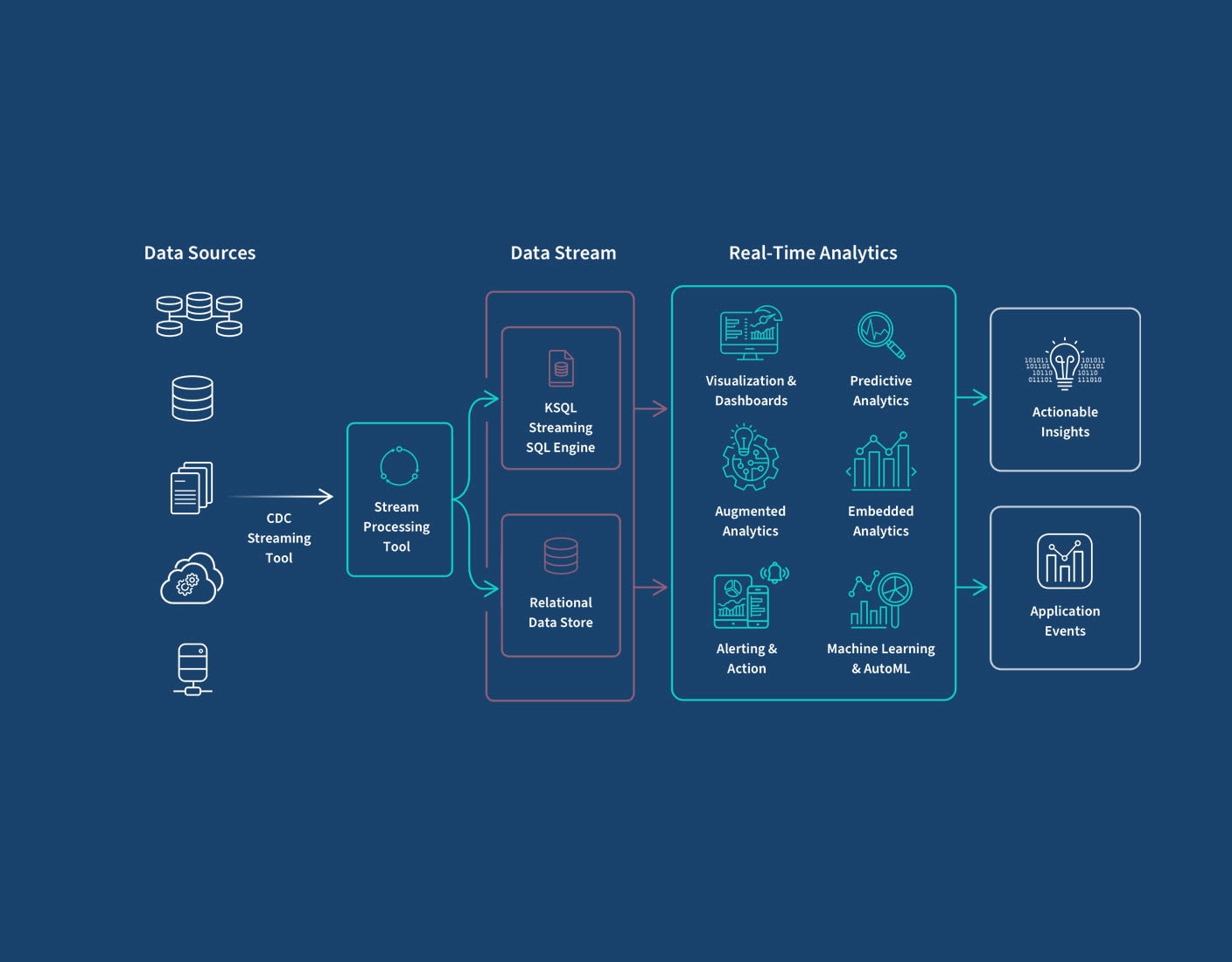
Source: Qlik
AI eliminates delays in time-sensitive actions by providing real-time insights. This means AI tools can quickly collect and evaluate crucial data, such as user behavior and website traffic, and recommend immediate actions.
For example, AI tools can identify website performance issues, such as slow-loading pages and high bounce rates. They can also evaluate your website structure and find issues to address immediately.
These real-time insights can also highlight positive changes. For example, if your landing page sees a sudden spike in traffic, the right AI tools can tell you what’s working in your campaign.
Predictive Analytics
Predictive analytics is one of the biggest advantages of AI website analytics. This technology evaluates historical data and predicts future opportunities and challenges. Marketers can use these insights to make data-driven decisions about future marketing campaigns. Predictive analytics is also the perfect technology for planning for seasonal trends and other industry changes.
Marketers can also use predictive analytics to evaluate different parts of a sales or marketing campaign. For example, predictive analytics can evaluate past sales data and identify high-value leads that are likelier to convert. For e-commerce businesses, this technology can assess past sales seasons and identify the products or categories more likely to perform well in upcoming sales seasons.
Personalization
According to a McKinsey survey, 76% of consumers say they would purchase from a brand that uses personalization. Also, using behavioral data for personalization can increase conversion rates by 20%.
AI website analytics is the perfect tool for boosting personalization. These algorithms can analyze data such as historical sales patterns to pinpoint buying habits, customer preferences, and churn risks. This means you’ll make more accurate customer profiles for your niche, region, and more.
Some of the other ways that AI website analytics can personalize the customer experience include:
- Recommending products and content specific to each user’s interests.
- Delivering dynamic website experiences, such as personalized landing pages.
For example, an e-commerce site might show users different homepage banners based on their past browsing behavior. And if you use email marketing, segmented personalized emails receive 46% higher open rates than regular ones.
Streamlined A/B Testing
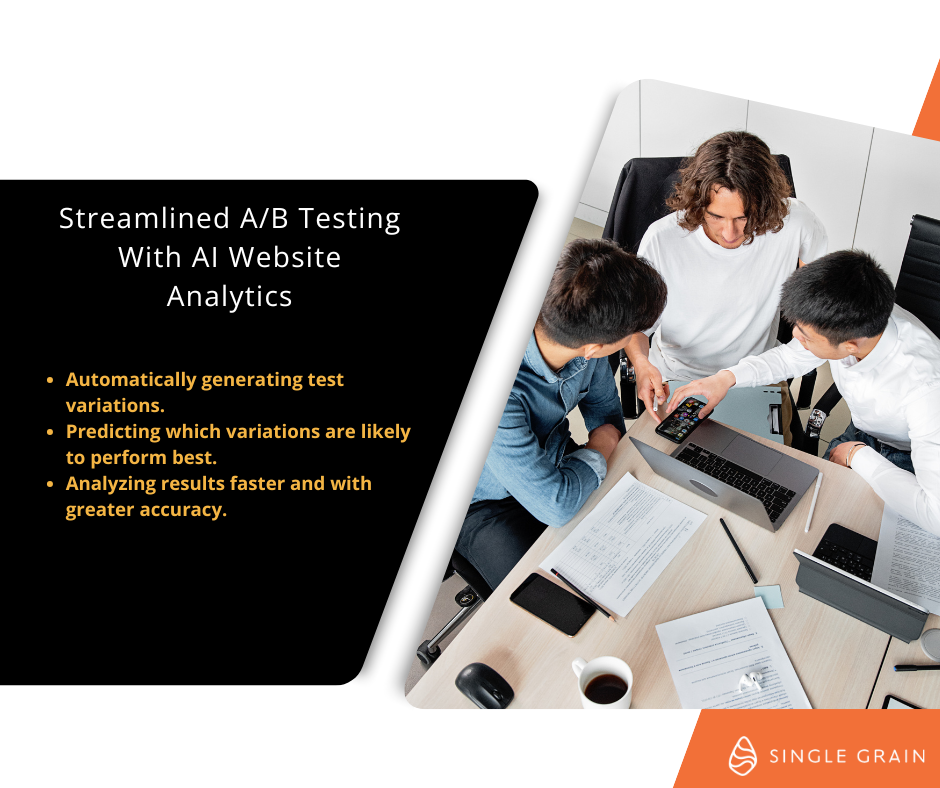
Marketers have always used A/B testing to find the best-performing marketing and advertising tactics. How can AI website analytics streamline the A/B testing process? It does this by:
- Automatically generating test variations.
- Predicting which variations are likely to perform best.
- Analyzing results faster and with greater accuracy.
This takes all the guesswork out of marketing, ensuring brands find the most effective strategies.
How to Integrate AI Website Analytics into Your Marketing Strategy
While AI website analytics offers many benefits, you should know how to align this technology to your objectives. Here’s some advice on how to implement AI web analytics into an existing marketing campaign, or you can work with us if you need more valuable insights.
Define Clear Objectives
Before diving into AI analytics, establish clear objectives. Understand what you need to achieve with your marketing campaign and highlight some realistic short and long-term goals. Examples include:
- Increasing website conversions
- Reducing bounce rates
- Understanding user pathways
- Optimizing content engagement
- Improving customer experience
- Increasing efficiency
- Out-perform competitors
These objectives will help you gather the most valuable insights to improve your campaign.
Choose the Right AI Tools
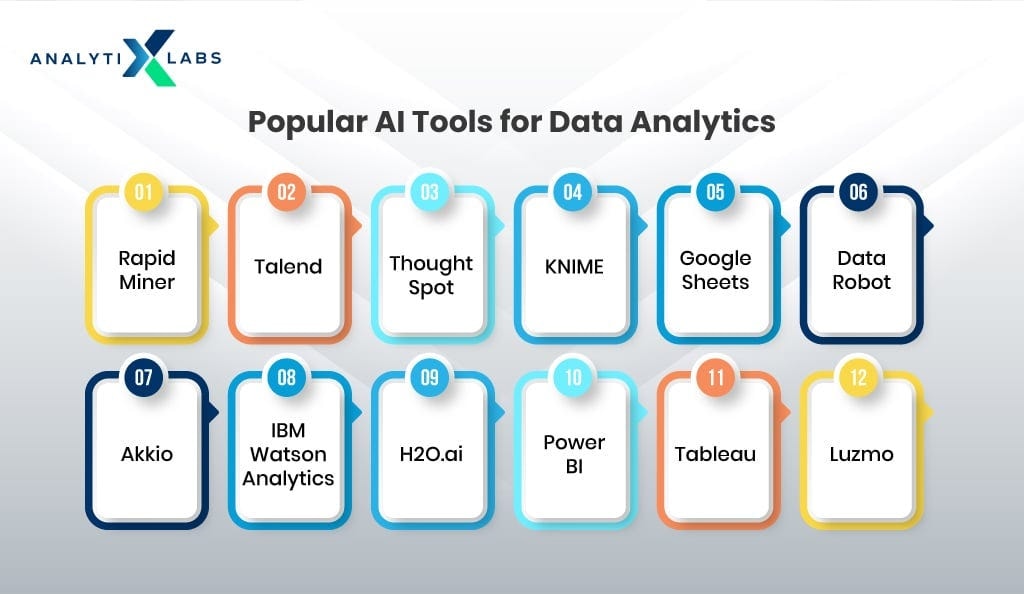
Source: Medium
There are various AI web platforms on the market now. These tools can analyze your website and make suggestions to improve your campaign and achieve your goals.
Some popular AI-powered website analytics tools include:
- Google Analytics 4: Incorporates machine learning for predictive insights and user-centric reporting.
- Hotjar: Offers heatmaps and session recordings enhanced with AI.
- Heap Analytics: Automates data capture and provides AI-driven insights.
- Crazy Egg: Uses AI to optimize user experiences through click tracking and scroll maps.
Other tools have niche focuses, such as:
- HubSpot for an all-in-one marketing and CRM platform.
- Optimizely for conversion optimizations.
- SEMrush for SEO analysis.
- Pingdom for web page performance.
- MarketMuse for content optimization.
- Shopify Analytics for e-commerce brands.
- IBM Watson Analytics for predictive and advanced analytics.
Monitor the Results
As AI website analytics scrapes and evaluates data, it will recommend changes you can make to your campaign. The more data AI systems process, the more accurate and valuable their recommendations become.
Challenges and How to Overcome Them
Despite its many advantages, integrating AI website analytics comes with challenges. Since 25% of businesses worry that AI will negatively affect their website, it’s crucial to prepare for these potential issues.
Data Privacy Concerns
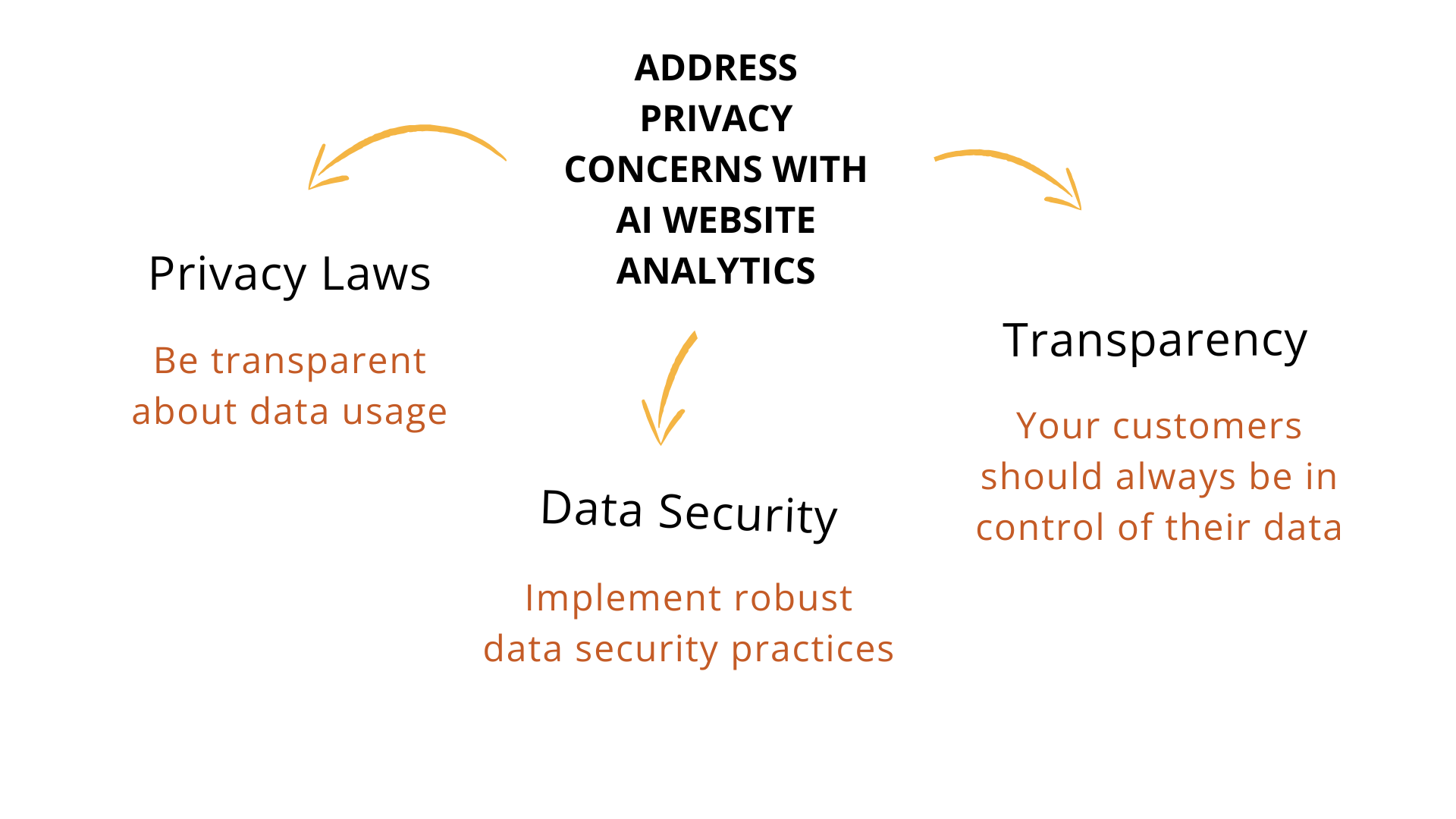
According to the Pew Research Center, 79% of adults say they’re very or somewhat concerned about businesses collecting and using their data. Since accumulating and processing site analytics with AI is still a relatively new activity, this technology hasn’t yet developed solid privacy practices. Businesses must also stay compliant with regulations like GDPR and CCPA.
The ways that businesses can address AI website analytics and data privacy are:
- Being transparent about data usage.
- Implementing robust security measures.
- Offering users control over their data.
Learning Curves
AI tools can be complex, especially for teams who have never used them before. Without proper training, staff members may run into errors when using these platforms, increasing the time it takes to perform these tasks. Organizations can overcome this by:
- Choosing user-friendly platforms.
- Investing in training for your team.
- Starting with small and manageable tasks.
High Initial Costs
While AI website analytics can improve your ROI, this technology may require an investment. While plenty of tools are free, others can set an organization back by thousands. This initial investment doesn’t include the costs to scale up and maintain these platforms.
If you’re on a budget, consider free or freemium tools. Many plans only offer paid services, and organizations must compare features and prices to ensure they get the best deal.
The Future of AI Website Analytics in Marketing
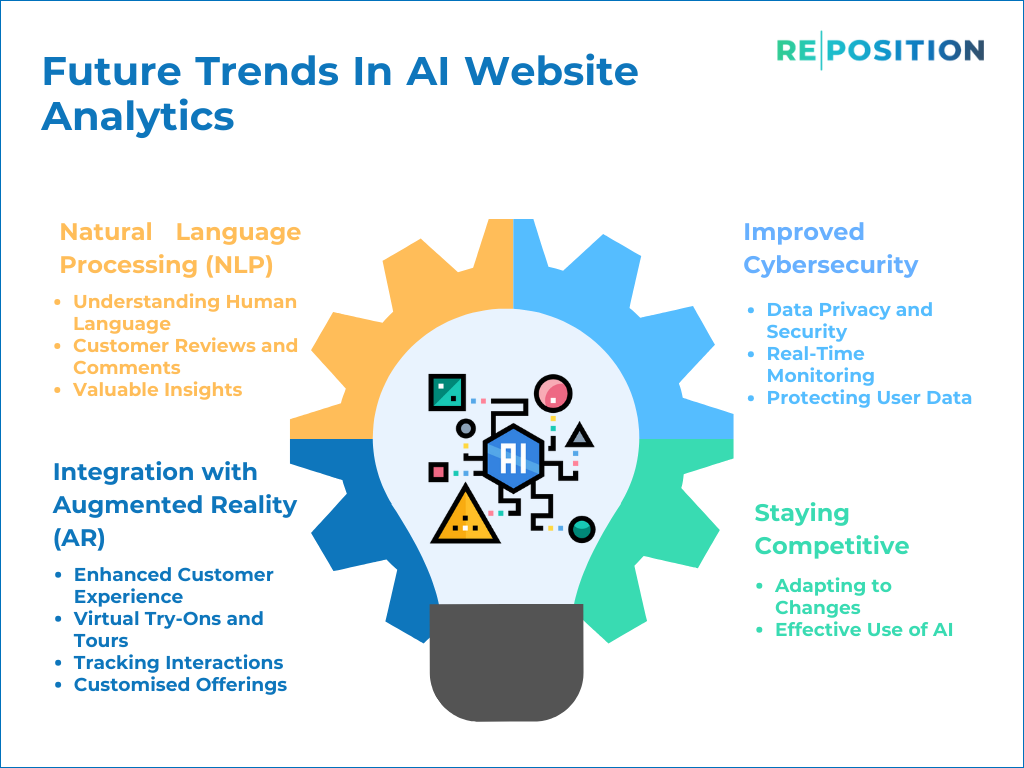
Source: Re|Position
AI in marketing will only advance and play a more vital role in daily operations. Web analytics tools powered by AI will only become more efficient and faster and may even replace traditional website analysis platforms.
As AI technologies continue to evolve, organizations can expect:
- More integrations: AI will integrate seamlessly across all marketing channels, unifying the most important strategies.
- Voice and visual analytics: Tools will be able to analyze vocal interactions and visual content for deeper insights.
- Hyper-personalization: AI will enable even more personalization, making every user interaction unique.
Use AI Website Analytics for a Data-Driven Strategy
Data analysts must understand their audience and how they interact with their website and marketing channels to increase sales and ROI. Website analytics platforms have offered crucial metrics that helped marketers make data-driven decisions that better nurture leads down the sales funnel.
AI website analytics has advanced this process, automating consumer data collection and analysis to offer suggestions in real-time. This technology allows marketers to gain audience insights, enhance customer experiences, and optimize entire campaigns.
While AI web analytics offers many benefits, this technology has its downsides. The key is to start small, define clear objectives, and continuously refine your strategy.
Automating data analysis can make your marketing campaign more efficient. But if you’re still struggling to increase sales and conquer the competition, partnering with marketing experts may help you better achieve your goals.
If you’re ready to level up your brand’s analytics tracking with AI, Single Grain’s AI experts can help!👇
Frequently Asked Questions on AI Website Analytics
-
How is AI used in data analysis?
Data analysis uses machine learning to analyze datasets and natural language processing (NLP) to extract and process written data from social media posts and emails. Automated workflows can also perform repetitive tasks.
These aren’t the only technologies you will find in AI web analytics. Predictive analytics can analyze historical data to predict future outcomes. Some tools also have sentiment analysis, which can interpret human emotions through data to gauge brand reputation and customer satisfaction.
-
How do I use AI web analytics tools?
All AI web analytics tools are different and come with their own processes. That said, there are best practices that marketers must apply to every platform.
Define clear goals and choose tools that include features to accomplish these objectives. For example, some tools may offer more insights into a content strategy, while others are better for personalized customer experiences. If you can, use tools that integrate with platforms you already use to access all data in one place. From here, monitor the insights and suggestions.
-
Which AI tools can analyze my website?
Numerous AI tools can offer insights into your website’s performance. Some of the best tools include:
- Google Analytics 4
- Adobe Analytics
- Heap Analytics
These are all-in-one AI web analytics tools. In the “Choose the Right Tools” section, we suggested tools for SEO, page performance, and more if you need a niche solution.
-
One of my web pages is getting low engagement rates. How can AI web analytics improve this?
AI-powered web analytics can analyze relevant data on your website and pinpoint any problems, such as technical issues or poorly performing content.
AI web tools can offer suggestions from here, such as fixing your web page’s issues or improving your content marketing strategy. Even if AI web analytics finds no problems, it can offer general suggestions, such as enhancing your CTAs or better segmenting your users. Always track metrics for these changes to ensure your engagement rates are improving.
-
What are other ways to use AI in a marketing strategy?
AI has transformed marketing in many ways. Here are other ways you can add AI to your marketing strategy:
- Dynamic content
- Lead scoring
- Chatbots
- SEO optimization
- Social media post automation and scheduling
- Ad optimization
- Real-time bidding
- Brand monitoring
- Voice search SEO
- Smart device integration
- AR/VR
- Churn prediction
- Behavior-based retargeting
Related Video
For more insights and lessons about marketing, check out our Marketing School podcast on YouTube.






